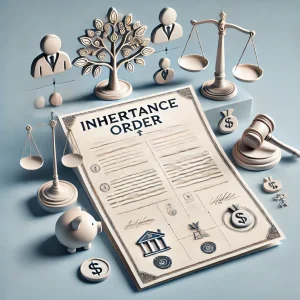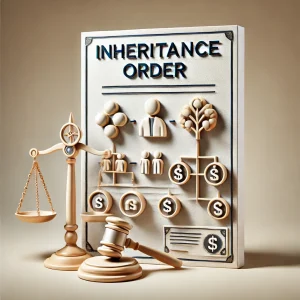An estate by definition refers to the total capital and property of a deceased person. In Israel, there are two ways to get the share you deserve in the estate of a deceased person. The first, if your share is registered in the will of the deceased, and the second, by observance of an inheritance order. When a person has reached his last day, and he has not left any will, his estate will be divided according to the rules of inheritance according to the law.
An inheritance order refers to the most common division of inheritance when the spouse receives half of the inheritance, and the children of the deceased will be divided equally in the second half. Chattels and vehicles will be transferred in full to the spouse and not shared with his children.
If the spouse is by common law, he or she receives a similar status as a married spouse. In the absence of children or a spouse, the division of the estate is done in other ways and with more distant relatives such as the parents and siblings of the deceased.
An inheritance order is a legal order that is granted by the Registrar of Inheritance, and in the framework of which the identity of the heirs is determined by law and what is the share of each person in the estate.

In order to obtain an inheritance order, it is necessary to apply for an inheritance order to one of the offices of the Registrar of Inheritance or to one of the rabbinical courts. According to the Registrar’s instructions, four sets of documents specified above must be attached to the application form. One original set for each party and three copies.
The following documents must be attached to the application
Original death certificate (or a true copy of the original).
Notices to additional heirs regarding the submission of an application for an inheritance order. This can be done with the approval and signature of the other heirs or attachment of mailings by registered mail.
Usually, such applications are filed through a divorce lawyer on behalf of the applicants (meaning the heirs or part of them), so he must attach the power of attorney given to him (or a true copy of the original), as well as indicate the area where the application was filed.
The deceased was a resident of Israel and must submit additional documents such as
Real estate registration in the name of the deceased and/or a bank account in the name of the deceased or other assets owned by him and which are associated with the place of jurisdiction of the Registrar of Inheritance to which the application was filed. On top, a formal order should be attached with the legal opinion of the foreign law or as prepared by a foreign legal expert.
The first document is the application form for an inheritance order when it is signed by the applicant (one of the heirs or more). The applicant’s signature must be verified by a notary/lawyer/judge / head of a local authority / rabbinical court. If the applicant is represented by an attorney in Divorce law, the applicant’s signature is part of the handling process at the law firm.
The fee for opening an application for the death of an inheritance order currently stands at NIS 496, which can be paid online on the website of the Registrar for Inheritance Matters of the Ministry of Justice. These amounts are updated from time to time on the website. The issuance of the order requires the attachment of the payment vouchers. A spouse, parent, or child of a person in military service or following terror acts and war, are exempt from these payments.

As stated, an inheritance order is relevant in the absence of a will. A will is a legal document in which a person instructs what will be done in the future with his estate after his death. In order for this document to be valid, it must be approved in the same way as an inheritance order in the Registrar of Inheritance Matters or in the Rabbinical Court. A will document will become valid if it has been made in accordance with the ways prescribed by law, and no defects have been found in it that may affect its validity and fitness.
